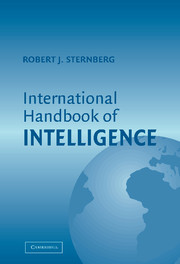Book contents
- Frontmatter
- Contents
- List of Contributors
- Preface
- 1 Intelligence Research and Assessment in the United Kingdom
- 2 Intelligence – Theory, Research, and Testing in the Nordic Countries
- 3 The Psychology of Human Intelligence in Spain
- 4 Psychology of Human Intelligence in France and French-Speaking Switzerland
- 5 Research on Intelligence in German-Speaking Countries
- 6 Is It Possible to Study Intelligence Without Using the Concept of Intelligence? An Example from Soviet/Russian Psychology
- 7 Intelligence Theory, Assessment, and Research: The Israeli Experience
- 8 Intelligence and Intelligence Testing in Turkey
- 9 Intelligence: What Is Indigenous to India and What Is Shared?
- 10 Japanese Conception of and Research on Human Intelligence
- 11 Diligence Makes People Smart: Chinese Perspectives of Intelligence
- 12 Similar Thoughts under Different Stars: Conceptions of Intelligence in Australia
- 13 Being Intelligent with Zimbabweans: A Historical and Contemporary View
- 14 Intelligence Research in Latin America
- 15 North American Approaches to Intelligence
- 16 Human Intelligence: From Local Models to Universal Theory
- Index
- References
10 - Japanese Conception of and Research on Human Intelligence
Published online by Cambridge University Press: 05 June 2012
- Frontmatter
- Contents
- List of Contributors
- Preface
- 1 Intelligence Research and Assessment in the United Kingdom
- 2 Intelligence – Theory, Research, and Testing in the Nordic Countries
- 3 The Psychology of Human Intelligence in Spain
- 4 Psychology of Human Intelligence in France and French-Speaking Switzerland
- 5 Research on Intelligence in German-Speaking Countries
- 6 Is It Possible to Study Intelligence Without Using the Concept of Intelligence? An Example from Soviet/Russian Psychology
- 7 Intelligence Theory, Assessment, and Research: The Israeli Experience
- 8 Intelligence and Intelligence Testing in Turkey
- 9 Intelligence: What Is Indigenous to India and What Is Shared?
- 10 Japanese Conception of and Research on Human Intelligence
- 11 Diligence Makes People Smart: Chinese Perspectives of Intelligence
- 12 Similar Thoughts under Different Stars: Conceptions of Intelligence in Australia
- 13 Being Intelligent with Zimbabweans: A Historical and Contemporary View
- 14 Intelligence Research in Latin America
- 15 North American Approaches to Intelligence
- 16 Human Intelligence: From Local Models to Universal Theory
- Index
- References
Summary
It is very hard to describe in a comprehensive way how intelligence has been treated in Japanese psychology and related areas in just a short chapter. We limit ourselves to three topics that highlight the contribution of Japanese psychology to our understanding of human intelligence, after briefly reviewing the Japanese history of intelligence research: (1) the development of indigenous intelligence tests, (2) the interaction between heredity and environment in intelligence, and (3) how “intelligence” is viewed in the Japanese culture.
INTELLIGENCE RESEARCH IN JAPAN: A HISTORICAL REVIEW
This review covers mainly the period of the 1860s to 1960s, but we will mention very briefly how education was pursued in the period preceding the Meiji Restoration. There was a fixed social stratification system in the Edo Era (age of feudalism), with no mobility. However, education was taken seriously in each stratum. Toward the end of the Edo Era, there were nearly 300 fief schools (hanko) in the country, and although no accurate statistics are available, several times that number of private academies (shijuku) existed (Amano, 1990). Children in the samurai stratum (the ruling class of warriors) usually were given moral education, rooted in the Chinese Confucian classics, at the fief schools. People in other strata learned the “three Rs” at private academies. Generally speaking, education was structured to preserve the shogunate ruling system. Only at the end of the Edo Era were innovative private academies established; these attracted ambitious students and offered foreign languages and modern, technical knowledge.
- Type
- Chapter
- Information
- International Handbook of Intelligence , pp. 302 - 324Publisher: Cambridge University PressPrint publication year: 2004
References
- 10
- Cited by

